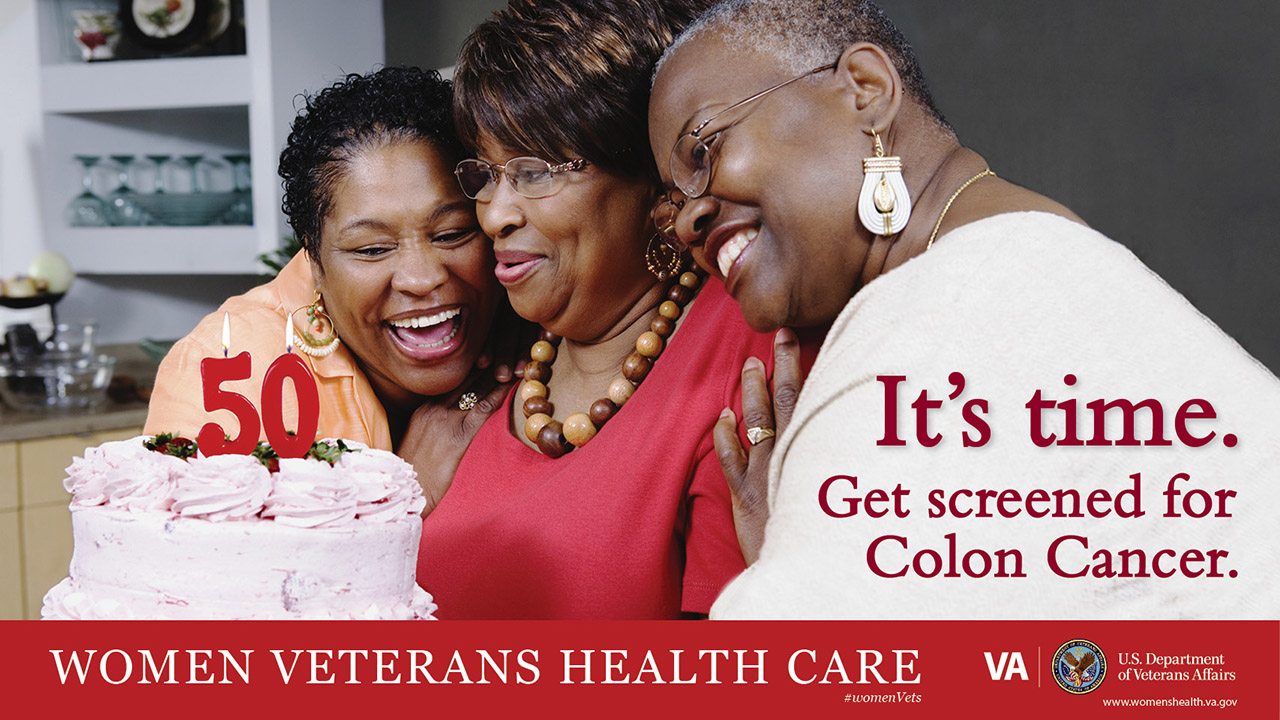Colon cancer is one of the most common diagnoses among both men and women in the United States. Approximately 4,000 Veterans are diagnosed with colon cancer each year.
The American Cancer Society estimates in 2017 there will be 135,430 new cases of colon and rectal cancer in men and women, resulting in 50,260 deaths. This number exceeds the total number of American combat deaths during the Vietnam War. But it doesn’t have to be. When colon cancer is found, and removed early, the chances of a full recovery are very good.
Most importantly — get screened.
The most effective way to reduce your risk of colon cancer is by having regular colon cancer screening tests. It is recommended to begin screening for colon cancer at age 50 years and continuing until age 75 years. It can take as many as 10 to 15 years for a polyp to develop into colon cancer and there may not be noticeable symptoms at first. The risk of getting colorectal cancer increases as you get older. More than 90 percent of cases occur in people who are 50 years old or older.
Are there symptoms?
Colon cancer or polyps that lead to colon cancer often don’t cause symptoms. That is why getting screened regularly for colon cancer is so important. If you have any of these symptoms, talk to your doctor:
- Blood in or on your stool.
- Stomach pain, aches, or cramps that don’t go away.
- Losing weight and you don’t know why.
Colon cancer risks and prevention.
The risk of having colon cancer increases if you are over 50 years old, have a family history or personal history of colon cancer, smoke, or have type 2 diabetes.
In addition to lifestyle factors and personal history, there are strong links between diet, weight, and exercise and the risk of colon cancer. To reduce the risk of colon cancer and improve your overall health it is important to:
- Stay at a healthy weight and avoid weight gain around the midsection.
- Stay physically active. Increasing your level of activity lowers your risk of colorectal cancer and polyps.
- Maintain a healthy diet. Overall, diets that are high in vegetables, fruits, and whole grains (and low in red and processed meats) have been linked with lower colorectal cancer risk.
- Limit alcohol intake to 1 drink on any one occasion.
VA’s priority is to screen its patients aged 50+ for colon cancer.
VA has been an early leader in recognizing the value of colon cancer screening and in taking a comprehensive approach to its screening program by developing policies and guidance about screening. VA’s screening rate exceeds the National Colorectal Cancer Roundtable (NCCR) goal and the national average, receiving Hall of Fame recognition by the NCCR.
- If you are 50 years or older talk to your VA provider about getting screened and your risk for colon cancer.
- Visit the Veterans Health Library to learn more about colon cancer and prevention.
- Women Veterans can call 1-855-VA-WOMEN (1-855-829-6636) to ask questions about available VA services and resources.
Select this link to watch an informative video on colon cancer screening.
About the author: Maggie Czarnogorski, M.D., works in Strategic Partnerships at U.S. Department of Veterans Affairs
Topics in this story
More Stories
Bob Jesse Award celebrates the achievements of a VA employee and a team or department that exemplifies innovative practices within VA.
The Medical Foster Home program offers Veterans an alternative to nursing homes.
Watch the Under Secretary for Health and a panel of experts discuss VA Health Connect tele-emergency care.







Cancer is really one of the most concerning issues these days for people in USA and even the world.
I have lost 2 of my family members because of cancer.
I really hope someday cancer be totally disappeared in all around the world.
Yes and if Dorn VA had bothered to screen me before age 62 I wouldn’t have ended up with rectal cancer, lost my rectum and ended up with a permanent colostomy. Radiation, chemo and the most painful experience of my life. No compensation no remorse, no apology for their willful act that was saving the VA money. My VA doc got pushback from the Dorn administration for me to even get a colonoscopy. Get screened, even if you have to pay for it yourself.
YES, I AGREE THAT A COLON / RECTAL EXAM CAN SAVE A VETERANS LIFE . IT SAVED MY WIFE’S LIFE, BUT THE V.A. CLINIC, IN PENSACOLA, FLORIDA, HAS NEVER GIVEN ME ONE, AND I AM 73 YEARS OLD . PLEASE HELP ME GET AN APPOINTMENT AT THE PENSACOLA V.A. CLINIC. CAN YOU PLEASE HELP ME ?
Mr. Hartley,
Our friends in VHA provided the following response:
Typically, in situations like this, the quickest way to get an appointment for specialized exams like the one you speak of is to work with your primary care physicians. Have you inquired about a colon/rectal exam with him or her? You can also work with the care team and patient advocates at the medical center who can assist you in getting the care you need in a timely manner. We will reach out to the center on your behalf. In the meantime, you can also keep in touch with your patient advocates, here is their information: https://www.biloxi.va.gov/patients/customerservice.asp
I must ask: If the risk of colon cancer increase as you age, why stop do you stop recommending screening at age 75?